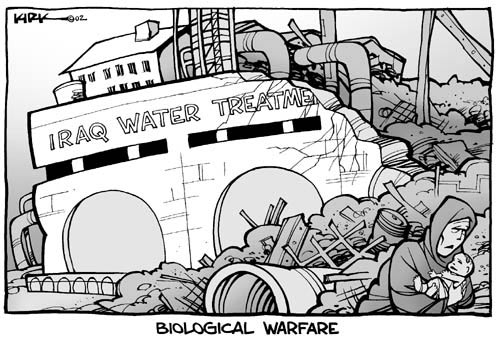
Iraq Water Updates
by Eric Benner
Water needs are not being met in Iraq. In researching what the BBC, The New York Times, and alternative media sources have reported about the water situation in Iraq, different reasons surface to explain why. Generally, lack of foresight into the "post-war" atmosphere led to a shift in priorities - reconstruction funds being reallocated (often for security) - and the US bombing of water treatment plants in the first Gulf War continues to cause problems today.
Shift in Funding Priorities
 |
In April, Alternet.org published a report from the United Nations Integrated
Regional Information Networks that included a warning from the Iraqi Ministry
of Municipality and Public Works that unless more funds are allocated, Iraq's
potable water needs will continue to not be met. An Iraqi citizen, Bushri Juhi,
from the Huriya neighborhood in the capital, stated that sewage and potable
water often get mixed. In his words, "we're forced to buy bottled mineral
water after we developed stomach diseases from drinking the potable water."(www.irinnews.org).
The article further quotes Ayad al-Safi (a ministry official in charge of technical
affairs) as stating, "The quantity of potable drinking water to be pumped
next summer will not exceed 59 percent of the real need, if the same obstacles
- like the lack of finances allocated to the ministry - continue." "Electricity
outages and fuel shortages will continue as they are." Al-Safi also blames
the US switch in funding priorities from reconstruction to security for the
lack of potable water. In 2005, $186 million dollars was set aside for the rehabilitation
of old water treatment plants and construction of new ones, which is a sharp
decrease from 2002 when $512 million dollars had been allocated. As of April
this year, only 6.8 million cubic meters can be produced of the 9.6 million
cubic meters of water needed for all of Iraq. The hope is that the newly formed
government will provide more funding to provide safe drinking water (www.irinnews.org).
On January 27, The New York Times reported that only 49 out of 136 projects
"originally pledged to improve Iraq's water and sanitation will be finished,
with about 300 of an initial 425 projects to provide electricity...." This
is due largely to reconstruction planners failing to take into account millions
of dollars in administrative costs, in addition to the failure to plan for the
appropriate funds needed to keep the plants maintained and running.
Planners underestimated the hostility reconstruction efforts and the occupation
would face, which also contributed to the shift in funding from reconstruction
to security. The Times reports that the biggest adjustment in priorities "came
when John D. Negroponte, then the American ambassador to Iraq, shifted $3.46
billion from the reconstruction fund to support projects involving the training
of Iraqi security forces, building democratic institutions and developing the
private sector in fall 2004." (The New York Times, 01/27/06)
Beginning
of the Crisis
The roots of the water crisis in Iraq go back to the first Gulf War. In 2001,
Project Censored reported that the fifth most underreported story in the US
was the US's intentional destruction of Iraq's water system during the first
Gulf War. The following years of economic sanctions by the United Nations further
exacerbated the situation by preventing the "importation of specialized
equipment and chemicals, such as chlorine for purification of water."
Even
the corporate sponsored World Water Forum, organized by the World Water Council,
acknowledges the seriousness of Iraq's water crises, although it ignores the
causes. The World Water Council was "…established in 1996 on the initiative
of renowned water specialists and international organizations, in response to
an increasing concern about world water issues…." According to the
"Middle East and North Africa Regional Document" released by the World
Water Forum in March of this year, the Iraqi population is still facing tremendous
hardships due to the past destruction of wastewater plants. The document quotes
the World Health Organization and United Nations Environment Programme that
the "country has suffered several cholera and other water borne disease
outbreaks." Currently Iraq needs approximately $15 billion to repair "a
dilapidated water system crippled by war and neglect." Baghdad and other
large cities struggle with water shortages. Water sources in the south and in
rural areas especially are unreliable and even "pose a serious public health
threat." (www.worldwaterforum4.org.mx)
The water problem in Iraq is hugely complex, but not enough is being done to
ensure the Iraqi people have access to clean water.